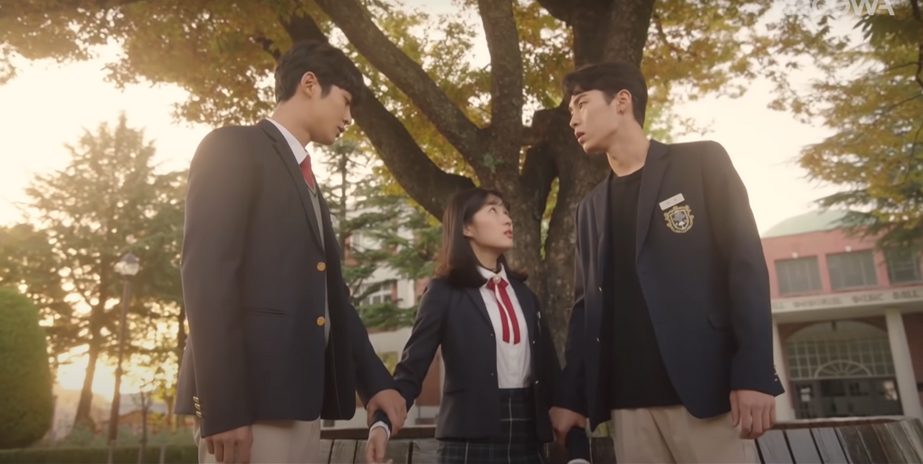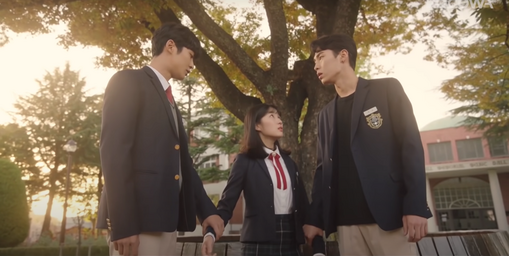I’m a big sucker for romantic dramas. Be it a sad, happy, dramatic or light-hearted one, I’m completely invested in the character’s relationship and personal development. And I love a good original plot that catches you off guard and the clichés that will never grow old.
As I grew older, I picked up on the nuances between a fictional romance and a real-life relationship. The on-screen romantic gesture that used to give me flutters now made me feel uncomfortable. I felt conflicted about the way that I was encouraging problematic behaviours in a romantic drama which I would not condone in reality.
How is it possible that I could feel giddy watching a female lead being dragged away by her wrist by a jealous male lead when in fact, I would be in a lot of distress to be placed in that position? This process of normalising problematic behaviours in romantic dramas as something desirable, to be taken lightly, and encouraged based on the belief that the male lead is going to end up with the female lead anyway, has been nurturing in the audience for decades.
Remnants of a patriarchal belief that masculinity is to be confined to force and dominance, and being forceful is considered to be romantic as long as you get the girl. These behaviours have been incorporated into romantic dramas and hold a considerable amount of influence over the current trends and expectations in society. Even if one was aware of the differences between an on-screen romance and a real-life relationship, the romanticised red flag behaviours in dramas will, in some way, affect the way that you think about these behaviours in reality.
As much as I enjoy watching romantic dramas, and I still do, I should not continue to dismiss the red flags portrayed on screen and address the inappropriate behaviours at hand.
Kissing without consent
I used to think that this was the cutest thing ever…. Then I realised that kissing someone without consent was NOT OKAY. In this scenario, Gil Ra Im (female lead) and Kim Joo won (male lead) were not in a relationship or dating each other. She was completely taken aback by what he did, and I would be too if somebody did that to me. It would make me feel confused, bewildered and outraged.
Even if you are dating the other person or are in the process of getting to know them, being kissed without consent is a disconcerting experience. It dismisses the other person’s opinions without giving them the time to think.
Consent requires time and decision from both sides. Be it in the form of prolonged eye contact, a moment to pause while you are leaning in, the other person reciprocating your actions or asking if you could kiss them. There are many ways to ask for consent, but being kissed while unguarded is not one of those ways.
Being in a relationship is no exemption. If your partner refuses to kiss you by avoiding you, pushing you away or telling you to stop, it is your responsibility to stop and respect them as an individual and as a partner.
Kabedon – The act of pushing someone against the wall
Ah… The famous ‘Kabedon’ scene is where a guy exudes a ‘dominant, alpha male’ energy and pushes a girl back against a wall. For some reason, it is considered romantic to trap a person against the wall to make a point. And I’m not talking about a scenario where both parties are sexually excited and acting in the heat of the moment.
It is this mainstream Kabedon scenario where a guy pushes a girl against the wall to “try” and reinforce his opinions onto her when she does not agree or refuses to listen to him. In reality, having a guy pushing himself onto you is both an unsettling and intrusive experience that should not be romanticized.
Stalking out of “concern and jealousy”
It’s one thing to be concerned and jealous towards a person that you are interested in, and a whole different matter to use it as a reason to be following them around in their personal lives, without their knowledge or approval. In fact, it is a crime to do so. Even if both parties have an interest towards each other, there is no reason to endorse this “stalker” behaviour in a drama by playing it off as something humorous or romantic. If a person is being followed without their consent, it is downright illegal and nobody would be comfortable knowing that they are being followed.
I am angry “for you”
The “you’re driving me crazy by wearing your short skirt and letting your guard down around other guys” trope where the male lead becomes protective of the female lead, getting angry at her for acting in a certain way. He tells her to wear long pants from now on because her legs are too pretty, or to stop hanging out with other guys because he wants her all to himself.
This troupe right here is the beginning of many red flags to come. If someone emotionally manipulates your behaviour and forces their demand onto you using the guise of protection and jealousy, they are not doing it for you. The difference lies in telling someone that “I am worried for you and I want you to know why” as opposed to “I am worried for you, so you should be doing this.” The former opens a conversation that allows for both parties to express themselves, while the latter prevents the other person from expressing themselves.
Setting romantic boundaries
To avoid this kind of red flags situation, we must set boundaries in every relationship. In this day and age, having clear boundaries can be exciting, uplifting and healthy for a relationship. Whether you are getting to know one another, dating each other or are in a definable relationship with them, it is important to ask for consent in doing anything. Never assume that the other person is comfortable with what you are doing and when unsure, ask for their opinions. Also, consent requires time for both parties to come to an agreement. By giving the other person time, you are also respecting them as an individual and a human being.
I personally believe that giving and receiving respect is one of the hottest and most romantic things ever. Having these two boundaries in a relationship will help to elevate the trust that you have with the other person.
Recently, there have been more romantic dramas emphasizing these two qualities but there are still plenty of shows out there that continue to romanticize problematic behaviours. Normalizing such actions encourages guys to perpetuate violent behaviours toward girls in the guise of ‘romance’, while girls might internalise inappropriate behaviours as something acceptable when it is not.
As much as I used to enjoy these scenarios, I am aware of the consequences of endorsing these behaviours, and that it is partly our duty as consumers to critique problematic behaviours portrayed on screen in order to set a better standard for romance on-and-off-screen in the future.


